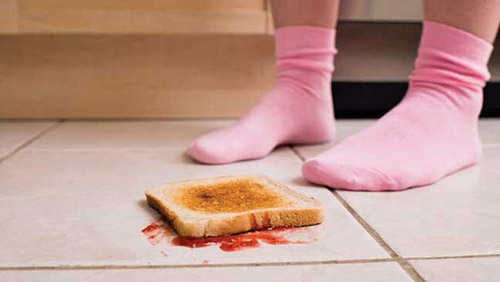
Drop everything! Unless it’s food, because scientists have recently discovered that the “five-second rule” is not backed by science.
Thanks a lot. We already knew that.
In case you have standards, I should explain that the five-second rule is a mesorah handed down through the generations—not from parent to child, obviously, but from older brother to younger brother to younger brother’s friend to friend’s younger brother—that if you drop food on the floor, it’s okay to eat, provided that it’s been on the floor for less than five seconds. Sometimes these five seconds are counted from the time you realized it fell. The food has to be really good. Bacteria wait five seconds before attacking good food, but if the food isn’t great, they come right away.
Also, if you claim you don’t know what the five-second rule is, you’re lying. According to a 2003 survey, 70 percent of women and 56 percent of men are familiar with the rule. And before all my male readers say that we’re better than women, they should realize that unfamiliarity with the rule doesn’t necessarily mean that you don’t eat any food that touches the floor, it means that you don’t care about limiting it to five seconds.
But according to a recent study, the five-second rule is too generous. It’s more like a second, like before anyone sees. Once someone else sees that you dropped food, it’s too late. At that point, it devolves into an argument between the person who made it and accidentally dropped it, and the person who did no work at all and just happened to see it fall. The underlying idea is, “I made the food; you don’t know how hard I worked. We’re eating this. If you knew what’s on my hands, the floor wouldn’t bother you so much. Also, I accidentally dipped my oven mitt into it when I pulled it out. I sweep the floor every day, but I haven’t washed my oven mitts in 15 years, ever since I shrunk a pair. So keep telling me that the floor is a problem.”
No one really believed the rule anyway. There’s no logic to it. There’s no reason that bacteria should be any different from any other dirt on the floor, meaning that if you drop the food directly onto the bacteria, you can assume it’s automatically stuck on, and if you don’t, five seconds shouldn’t be enough for the bacteria to sprint across the room and leap onto it. Those things are tiny, and they don’t even have legs.
And how come it only works for food? If you drop your tefillin, chas v’shalom, can you yell, “Five-second rule!” and you don’t have to fast? If you drop your small electronic device in the toilet, can you yell, “Five-second rule!” and then you don’t have to slowly rebuild your life?
Actually now, come to think of it, maybe you’re supposed to yell “Five-second rule!” for food so the bacteria know that they have to give you a chance to pick it up. Otherwise it doesn’t work.
The truth is that before this study, most people never actually believed the rule anyway. It’s more about being a social fiction that we all have to believe is true in order to eat food that we were really looking forward to without it, say, affecting shidduchim. We all know it doesn’t work, but the second we admit that it doesn’t work, the whole thing falls apart. So thanks a lot, scientists.
But according to the researchers, their experiment was not a total waste of time. “If we do get sick from a food, we tend to think about what we ate that may have made us sick, not the place we ate it from.” No one realizes the danger, because no one’s ever died while still eating the floor food.
So if the rule doesn’t work, where did it come from? It’s not in the Torah.
So I looked it up, and near as I can tell, it can be traced back to the time of the Barbarians. And you know what they say: If the Barbarians came up with a rule about dropped food being okay to eat, it must be true.
Though maybe the rule is in the Torah. Maybe it dates back to manna in the Midbar, which had a 24-hour rule. Of course, you can’t really compare the divine protection that Hashem provided in the desert with the normal things that go on every day. We don’t really understand the manna, and we have a lot of questions about it, like why is it spelled manna? Is it because man is a person? Why is there no good way to spell manna in English without making you look like you can’t read Hebrew?
But even if the rule has a source, where did the five seconds come from? Did they just make that up, or did they experiment with various times? Like maybe in the 13th century, it was a 12-hour rule, and people were still dying, so they decided to shorten it to 10 hours, and so on.
So my guess is that the entire rule has more to do with making sure that the person picking it up is the one who saw it fall and knows for a fact that no one stepped on it. If polite society gave you longer than five seconds, you’d probably run to get a knife and fork, and while you’re gone, a herd of elephants would come through your kitchen.
By Mordechai Schmutter
Mordechai Schmutter is a freelance writer and a humor columnist for Hamodia and other magazines. He also has six books out and does stand-up comedy. You can contact him at [email protected].










